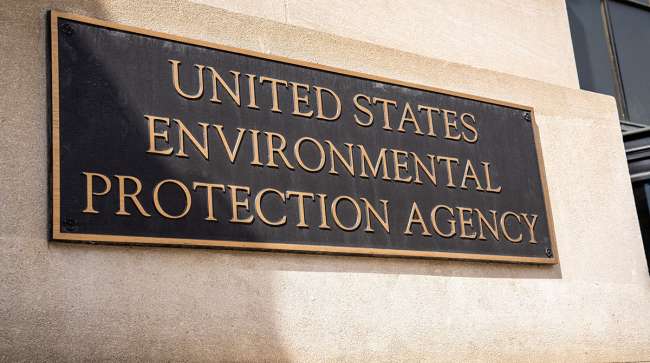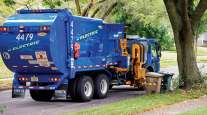Senior Reporter
Litigants Allege EPA Cannot Legally Mandate Electric Trucks

[Stay on top of transportation news: Get TTNews in your inbox.]
The Environmental Protection Agency lacks legal authority to mandate electric vehicles, according to a court brief filed by a coalition of 24 states and various economic interests seeking federal appellate court review.
The U.S. Court of Appeals for the D.C. Circuit review request challenges EPA’s “Greenhouse Gas Emissions Standards for Heavy-Duty Vehicles-Phase 3.”
The Oct. 16 court filing alleges the mandate requiring large trucks to transition to all-electric vehicles would significantly impact truck manufacturers, fuel and energy markets, the biofuel industry, farmers and trucking companies.
“Despite that lack of congressional authorization, EPA has announced a de facto electric heavy-duty vehicle mandate that, like its light-duty-vehicle mandate, sets greenhouse-gas emission standards that manufacturers can meet only by decreasing production of internal-combustion-engine vehicles and dedicating an increasing percentage of their fleets to electric vehicles or subsidizing the electric-vehicle production of their competitors through credit purchases,” the brief said. “These new standards are so stringent that EPA projects some 45% of America’s new heavy-duty vehicles will be electric by 2032 to comply — up from practically zero today.”
EPA is finalizing stronger standards to reduce greenhouse gas #emissions from heavy-duty vehicles such as delivery trucks and tractor-trailers. These new standards will benefit public health and save truck owners and operators money.https://t.co/SDv5W0Gt1q pic.twitter.com/n42uVpz8hV — U.S. EPA (@EPA) March 29, 2024
Nebraska is leading the 24-state coalition seeking to block EPA’s rule. The other participants range from fuel groups to the Arizona state Senate. The coalition first filed its review request with the appeals court in May.
“Historically, EPA promulgated greenhouse gas-emission standards for heavy-duty vehicles jointly with the National Highway Traffic Safety Administration and set standards that could be achieved without electric vehicles,” the court document said. “But in April 2023, after the administration signed its international accord, EPA proposed its first-ever solo greenhouse-gas emission standards for heavy-duty vehicles. Finalized on April 22, 2024, those standards — at issue in this case — are more stringent than any prior standards.”
The appellate review-request brief said that two aspects of EPA’s new heavy-duty emission standards are key to the agency’s effort to force electrification of the nation’s heavy-duty vehicle fleet.
First, EPA promulgated standards that manufacturers can meet only on a fleet-average basis, rather than an individual-vehicle basis. Second, EPA decreed that in determining a manufacturer’s compliance with the standards, electric vehicles will be treated as producing zero emissions, according to the group’s brief.
California's ACF rule sets wildly unrealistic targets and timelines that are already creating confusion on the West Coast and threaten to cause severe disruptions to our supply chain nationwide. Thank you to @RepDavidValadao and his colleagues for pushing back against this… https://t.co/iWQHDJAdV0 — American Trucking (@TRUCKINGdotORG) September 27, 2024
“The economic significance of EPA’s rule is immense,” the group of participants argued. “By EPA’s own projection, the rule will cost vehicle manufacturers well over $20 billion through 2055. And EPA reaches that projection only by assigning much of the relevant cost (which its rule would independently impose) to California’s Advanced Clean Trucks program, which faces pending litigation.
“Absent that sleight-of-hand, the projected costs to manufacturers alone would be well over $50 billion, which will be passed on to businesses and consumers. EPA’s electric-vehicle bias also caused it to arbitrarily ignore biofuels as a “viable” and “obvious alternative” for reducing greenhouse gas emissions.”
The group also argued that battery-electric heavy-duty vehicles typically have shorter mileage ranges than internal-combustion-engine vehicles, take longer to refuel and are substantially heavier — meaning that each trip takes longer and carries less freight.
McLeod Software CEO Tom McLeod explores the potential for artificial intelligence to boost efficiency and build resilience. Tune in above or by going to RoadSigns.ttnews.com.
“Forcing a shift from nearly zero new electric heavy-duty vehicles today to 45% by 2032 will cause major logistical challenges and increase transportation costs nationwide, affecting some two-thirds of all freight moved in the United States and countless businesses,” the review request document said. “Those effects collectively make the major economic significance of EPA’s rule indisputable.
“Nor will the necessary public charging infrastructure exist in the time frame EPA imagines. [20-megawatt] stations are not easy to build and permit, and adding one is equivalent to adding a whole town to the electric grid. EPA is also overly optimistic about the grid upgrades needed; it assumes that transformers can be installed in three to eight months, but transformers take two to four years to be delivered and installed.”
Want more news? Listen to today's daily briefing below or go here for more info:





